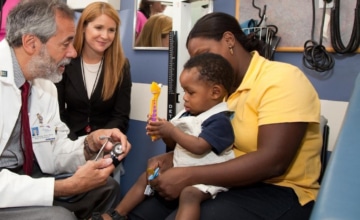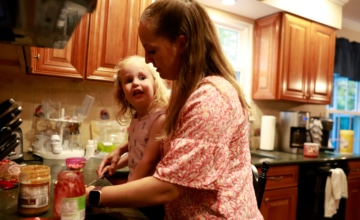When I joined ZERO TO THREE’s Policy Center in the spring of 2018, my primary responsibility was to help the organization develop and launch the State of Babies Yearbook.
The goal of the Yearbook, then and now, has been to provide a comprehensive national and state-by-state look at the well-being of the nation’s babies and families. The Yearbook’s release in 2019 was the first time a report of this type had addressed the infant and toddler age group, so it’s been exciting to be a part of it. Three years later, we released the third annual edition, I think with even greater excitement. Like a baby, the Yearbook is continuously growing and evolving to meet the changes in the world around it. This continues to make each edition of the Yearbook unique. The 2019 edition, very fittingly, was released on Capitol Hill, with Congressional members among the speakers affirming the value and importance of having this information available for their states. The Policy Center’s plan from the start was to expand the Yearbook, to the extent data were available, to focus on equity and racial and ethnic disparities behind all of the averages. While we were thrilled to be able to do that for 2020, the timing and nature of the Yearbook release was of course impacted by both the COVID-19 pandemic and the country’s focus on racism in the wake of George Floyd’s murder.
The virtual release of last year’s report, with discussion of both of these important issues, was very well received and opened the possibilities for the current 2021 Yearbook. This year’s report includes data for even more races/ethnicities. It’s also unique in that, in light of the ongoing pandemic, it includes both pre-COVID circumstances for babies and families from the national dataset sources and, with the partnership of the RAPID-EC team at the University of Oregon, includes recent real-time data on how families are faring economically, emotionally, and in the services they are or are not receiving (e.g., changes they have experienced in well-child visits, vaccinations, job losses, and child care).
“It’s also unique in that, in light of the ongoing pandemic, it includes both pre-COVID circumstances…. [and] recent real-time data on how families are faring economically, emotionally and in the services they are or are not receiving.”
A final piece that all of us who are involved in producing the Yearbook are proud of is the growth that we have also been able to see in our stateofbabies.org website. Each year we have expanded the functionality to make it a go-to informative tool for policymakers, advocates, and early childhood stakeholders in general. This year we were able to add comparative views of all states’ data for indicators together as well as special sub-report views of indicators related to topics we know are of particular importance as a result of the pandemic, such as Material Hardship; Experiences of Babies in Families with Low Income; and Race, Ethnicity, and the Health of Babies.
The response to the 2021 Yearbook has been tremendously positive and assures us that we’re on the right track in meeting the needs of our diverse ZERO TO THREE audiences. I can wholeheartedly say that creating the Yearbook is not something I alone can take credit for. It requires a large—very large—team effort to which our partners at Child Trends and our ZERO TO THREE colleagues, throughout the Policy Center and Communications division in particular, contribute heavily each year. My hope is that the Yearbook will continue to make meaningful “baby steps” and, most importantly, that it will become an even more well-known resource for all interested in the well-being of the littlest among us.
Download the 2021 State of Babies Yearbook, explore your state’s data, and learn more about how you can take action at the State of Babies website.




